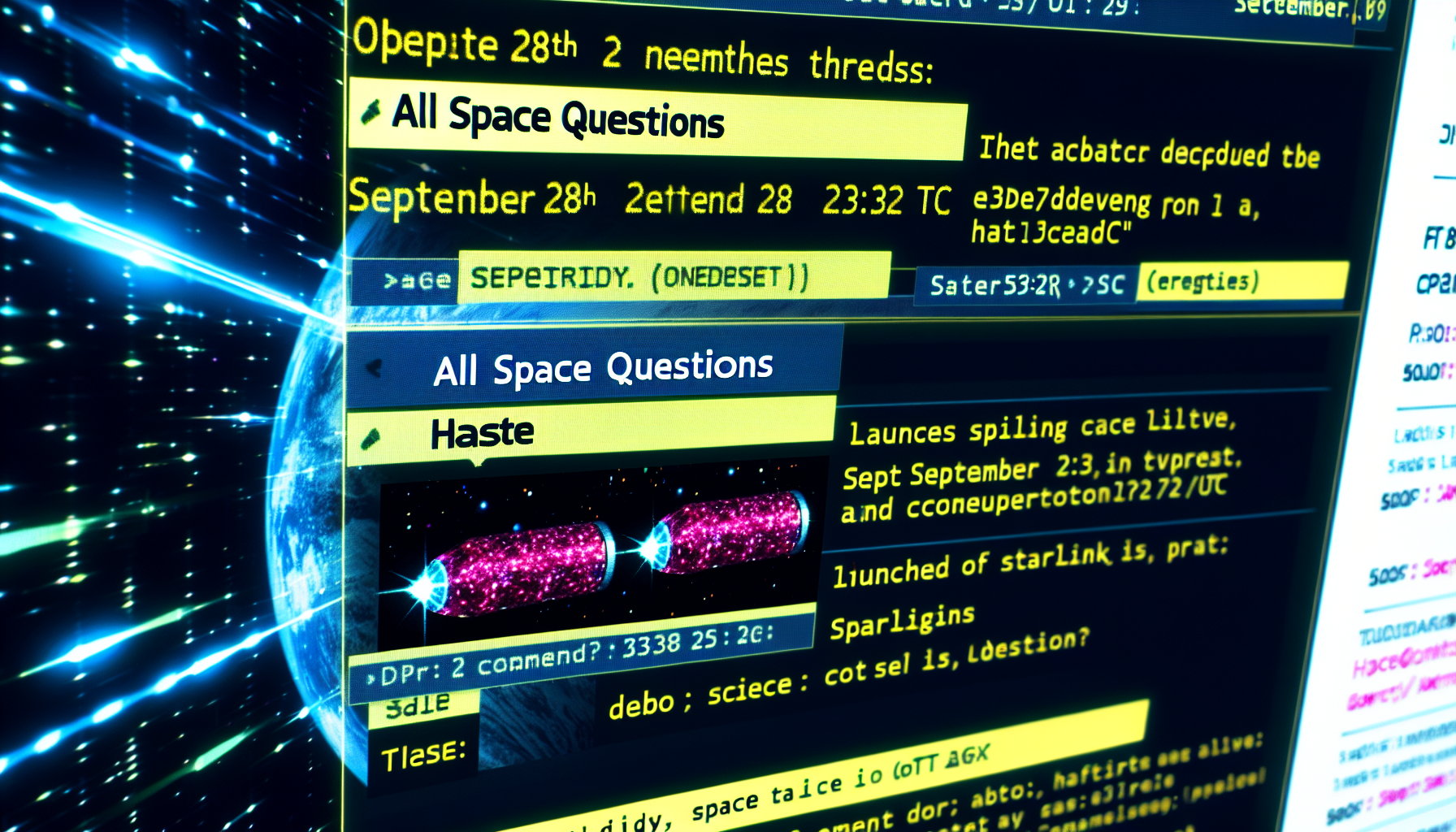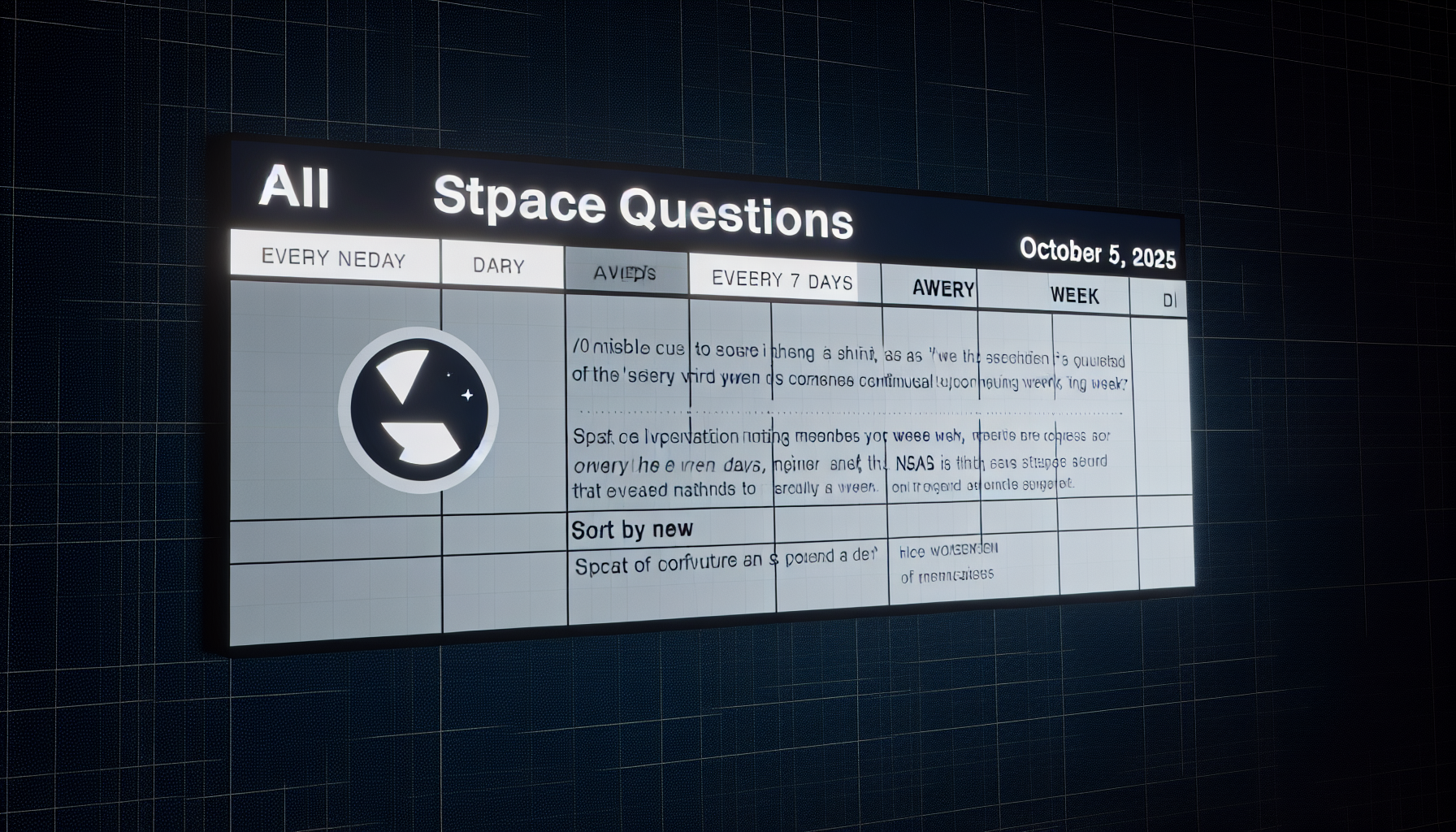The All Space Questions weekly thread for the week of September 28, 2025 is the subreddit’s open forum for every orbital, mission, and night-sky query—and it again urges readers to sort comments by “new” so fresh questions don’t get buried under “hot.” This week’s timing is ideal: multiple near-term launches provide crisp, time-stamped events that can anchor technical Q&A about orbits, visibility, and network growth [1].
Key Takeaways
– Shows moderators reiterate ‘sort by new’ per Dec 25, 2020 meta policy centralizing simple questions and linking repeats back to weekly threads. – Reveals two Sept 28 Starlink missions: Group 10-59 at 07:30 UTC and Group 11-20 at 23:32 UTC, shaping timely LEO Q&A. – Demonstrates Wikipedia’s manifest includes Sept 29 Starlink Group 11-20 from Vandenberg, underscoring schedule variability across late September and October 2025. – Indicates March 30, 2025 All Space Questions thread covered temperatures, orbital dynamics, and Mars debates with linked explanations, sustaining expert, citation-rich engagement. – Suggests a Sept 29 HASTE suborbital flight will spur propulsion and test-flight questions alongside routine Starlink deployment topics on satellites, orbits, and visibility.
All Space Questions: what the weekly thread is and how it works
The All Space Questions thread exists to absorb recurring beginner and intermediate questions while giving experts a centralized place to provide authoritative answers. The format reduces subreddit clutter and makes linkable, repeatable explanations easier to find and reference. Moderators emphasize the visibility differences between “hot” and “new”; posting and browsing in “new” keeps recent or less-upvoted questions discoverable for knowledgeable respondents who patrol the queue [3].
All Space Questions: posting tips to surface your query
Craft a descriptive title that includes the specific object or event, plus a number or timestamp. For example: “Will Starlink Group 10-59 at 07:30 UTC be visible from X latitude?” Add one to three concrete details—UTC times, coordinates, magnitude estimates, or mission IDs—so specialists can respond decisively. Include what you’ve already checked (e.g., Heavens-Above predictions, prior threads) to avoid duplication. Then sort the thread by “new,” reply to clarifying questions promptly, and circle back to mark accurate answers for future readers.
If you are answering, link to first-principles explanations or reputable mission pages, and quantify claims wherever possible. Conversions (UTC to local time), rule-of-thumb orbital periods, and inclination ranges make responses both verifiable and teachable. Remember that the weekly format means readers will return later; a cogent, cited answer becomes a durable resource.
Launch timing for Sept 28–29 to guide your questions
Time-sensitive events sharpen questions and answers. On Sunday, Sept 28, KeepTrack lists two SpaceX Falcon 9 Starlink missions—Group 10-59 at 07:30 UTC and Group 11-20 at 23:32 UTC—followed by a Rocket Lab HASTE suborbital launch on Monday, Sept 29, subject to routine schedule caveats [4].
Manifests can differ by source and update cadence. Wikipedia’s current Falcon 9 list shows a Sept 29, 2025 entry for Starlink Group 11-20 launching from Vandenberg, alongside further Starlink and Kuiper missions moving into October 2025 [5].
For readers, this variability is a feature, not a bug. It gives you specific items to probe—What’s the typical slip window? How does site selection (Vandenberg versus Cape Canaveral) alter inclination or visibility? What’s the expected orbital shell for the group IDs named this week? And for observers, it sets a clear timebox to ask whether twilight conditions or local weather will affect naked-eye visibility or binocular tracking.
Evidence from prior weeks: how discussions evolve
Past weekly threads show the breadth of questions and the value of precise, sourced replies. In the March 30, 2025 edition, contributors fielded inquiries on planetary temperatures, orbital dynamics, and Mars colonization arguments, usually pairing explanations with links and examples to support claims [2].
That same model scales well to launch-heavy weeks like this one. Questions that include times (07:30/23:32 UTC), mission IDs (Group 10-59/11-20), and sites (Vandenberg versus Florida) invite practical, data-rich answers. They also allow experts to show their work—calculating overflight timing, discussing orbital shells and inclination bands, or estimating pass brightness by phase angle and altitude.
Why sorting by “new” matters for visibility and accuracy
Sorting by “new” is more than etiquette; it is a discovery mechanism. New posts may not hit “hot,” even when they’re technically interesting. Early expert replies often arrive within minutes to hours after a launch time is posted; if your question sits under “hot,” it can lag behind spikes in attention and miss the most informed readers. Conversely, a well-framed question surfaced in “new” can attract a niche specialist who knows a given launch vehicle, radar cross-section nuances, or orbital perturbations from firsthand work.
It also reduces duplication. When schedules shift by hours or a day, many ask the same follow-up—“Is my pass still visible?”—but sorting by “new” channels attention to that day’s canonical answer. If you see repeats, link back to the most complete reply and add any location-specific clarifications in a nested comment.
What to ask this week: a data-oriented checklist
Use this checklist to craft questions that experts can answer with numbers and citations: – Launch time precision: Quote UTC times (07:30 and 23:32) and your local offset; ask how civil/nautical twilight affects visibility in your city. – Mission IDs: Reference Group 10-59 or Group 11-20; ask about their orbital shell, inclination, and plane count implications for ground-track predictions. – Launch site and azimuth: Ask how Vandenberg trajectories differ from Florida for initial inclination and first-orbit overflights in your latitude band. – Pass prediction tools: Compare outputs from two trackers; ask why predictions diverge pre-insertion versus after TLEs are published. – Suborbital context: For HASTE on Sept 29, ask about mission profile, apogee ranges, and how suborbital telemetry differs from LEO operations. – Starlink visibility: Ask for magnitude estimates on first/second orbits post-deployment and whether recent “dimming” coatings alter expectations. – Orbital mechanics: Query phasing maneuvers, drift to operational altitude, and time from deployment to stable plane insertion for groups launched hours apart. – Radio and interference: For amateur radio, ask about expected downlink bands and whether recent policy changes affect reception or interference models.
All Space Questions: posting etiquette to keep answers high-signal
Treat the weekly thread as a living reference. Before posting, scan “new” for near-duplicates, especially during launch windows when many observers are asking the same visibility question. If your topic was addressed, reply there with your exact coordinates or time window to keep knowledge consolidated. When you get an answer, acknowledge what resolved your confusion and include any follow-on measurements you made. Those confirmations turn one-off corrections into reusable, quantitative insight for hundreds of later readers.
All Space Questions: how schedules shape better questions
Launch timing drives specificity. Two launches on the same day present a built-in experiment: compare first-orbit pass geometry, brightness, and ground tracks between a 07:30 UTC and a 23:32 UTC ascent. The nearly 16-hour separation changes local darkness, atmospheric conditions, and viewing angles around the world. Asking comparative questions framed by those times invites answers with plots, TLE analyses, and inclination math that can educate everyone following along.
Meta guidance and the role of citations
The r/space meta guidance asks users to centralize basic questions and to direct repeats back to the weekly thread so the subreddit stays navigable and high-quality. It also emphasizes how “hot” and “new” rankings differ, encouraging readers to browse and post using the “new” sort to keep the focus on timely questions that might otherwise be missed [3].
This week’s workflow for askers and answerers
For askers: – Write the title with the event, the timestamp, and your location. – Add a concise body with what you calculated and where you’re unsure. – Sort “new,” monitor replies in the first hour, and provide any requested detail (coordinates, horizon limits, equipment).
For answerers: – Lead with the number—time, angle, magnitude, pass duration—then show the method or tool used to compute it. – When schedules slip, update your comment with the revised time and an edited headline for visibility. – Where possible, link out to mission IDs or official manifests so readers can verify details later.
Looking ahead to post-launch learning
After this week’s flights, consider follow-ups that build collective knowledge. Ask how quickly TLEs appear post-deployment and whether first-night “train” visibility persists for these groups. If you attempted radio reception, share frequency logs. If you observed from twilight, report what altitude and azimuth angles produced the clearest view. These reports create durable records that future All Space Questions readers can search and apply to their own observing plans.
Source-based pointers for deeper context
If you want background on how the weekly thread functions and why moderators keep emphasizing “sort by new,” read the All Space Questions thread format and the subreddit’s meta guidance explaining the policy intent and visibility mechanics [1]. For topic ideas and answer styles, skim last spring’s weekly thread that tackled temperatures, dynamics, and Mars, then adapt that evidence-backed approach to this week’s launch-heavy context [2]. For precise timing prompts, use the scheduled Sept 28 and Sept 29 events as anchors for your questions [4][5].
Sources:
[1] Reddit (r/space) – All Space Questions thread for week of March 23, 2025: www.reddit.com/r/space/comments/1ji3xo1″ target=”_blank” rel=”nofollow noopener noreferrer”>https://www.reddit.com/r/space/comments/1ji3xo1
[2] Reddit (r/space) – All Space Questions thread for week of March 30, 2025: www.reddit.com/r/space/comments/1jngyng” target=”_blank” rel=”nofollow noopener noreferrer”>https://www.reddit.com/r/space/comments/1jngyng [3] Reddit (r/space) – [META] The “All Space Questions” thread exists for a reason. Please use it: www.reddit.com/r/space/comments/kju162″ target=”_blank” rel=”nofollow noopener noreferrer”>https://www.reddit.com/r/space/comments/kju162
[4] KeepTrack.space – Space Brief 25 Sep 2025: https://keeptrack.space/space-brief/space-brief-2025-09-25 [5] Wikipedia – List of Falcon 9 and Falcon Heavy launches: https://en.wikipedia.org/wiki/List_of_Falcon_9_and_Falcon_Heavy_launches
Image generated by DALL-E 3











Leave a Reply